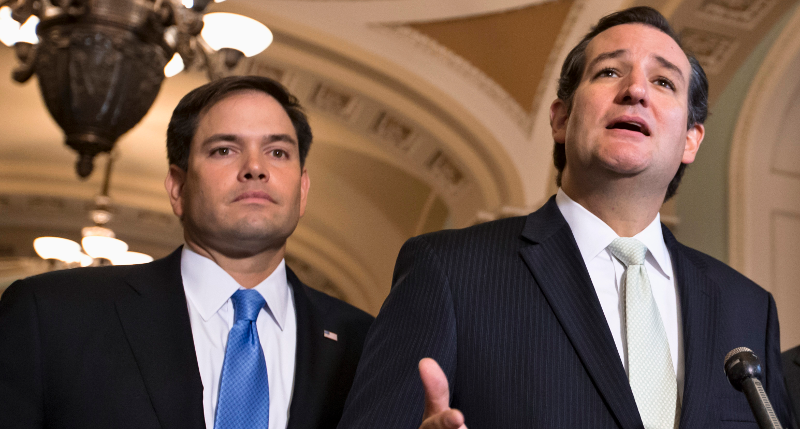Hello, I'm Will Jordan and welcome to The Pulse.
The Pulse is a weekly newsletter YouGov is launching ahead of the 2016 primaries and general election to give readers a one-stop-shop for the latest polling-related news from the campaign.
In addition to YouGov’s own extensive coverage of the election, The Pulse aims to provide you everything you need to know about the horse race, the candidate’s images and the issues resonating with voters.
In the latest YouGov/Economist Poll, conducted last weekend, Donald Trump leads with 35%. Seven other national polls have been conducted since the December 15th Republican debate, and six of them have Trump between 34% and 39%.
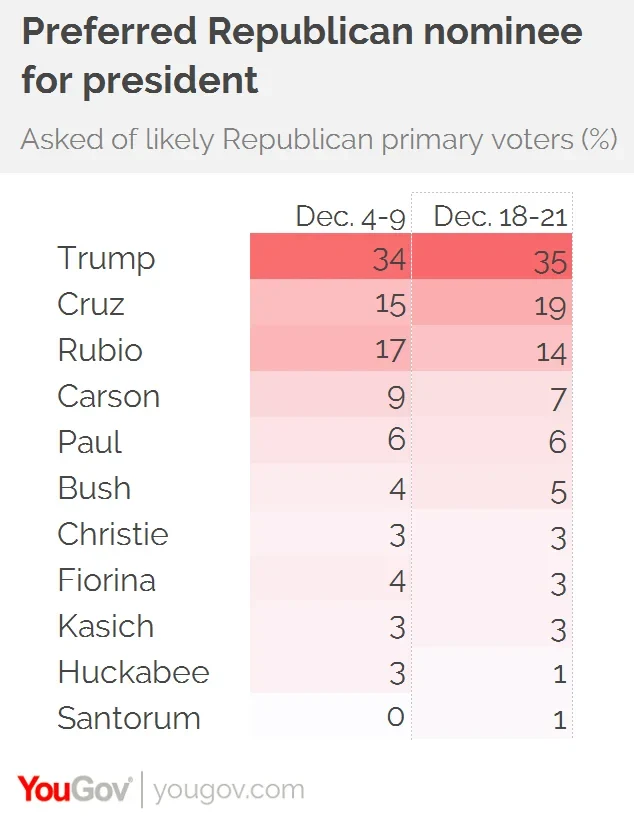
There’s a lot of talk about Ted Cruz, who has risen to a solid second place nationally. There is, however, no national primary, but remember there are actual Iowa caucuses on February 1st. More on that below.
First, the Democratic primary, which shows an uptick for Sanders. YouGov recently began including a "likely primary voter" filter, which takes registered voters and accounts for frequency of voting in primaries and which primary respondents say they will vote in. Independents who say they are likely to participate in a Democratic primary lean much more heavily towards Sanders, so he does better with this filter than with a Democrats-only sample.
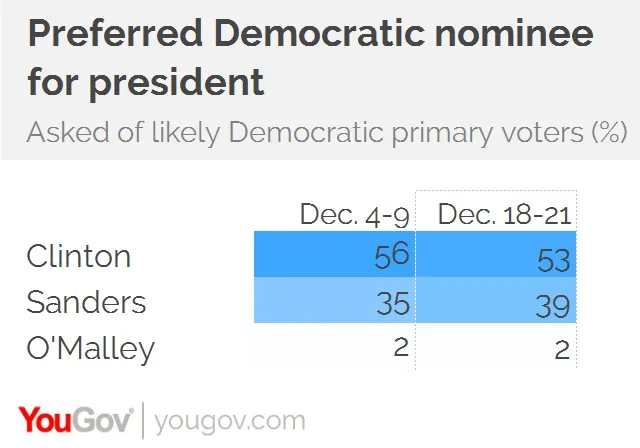
Lindsey Graham calls it quits
Lindsey Graham’s exit is unlikely to have an immediate impact on the race, at least in the sense that no one is likely to get a “boost”. Harry Enten of FiveThirtyEight used the chart below to demonstrate why not:
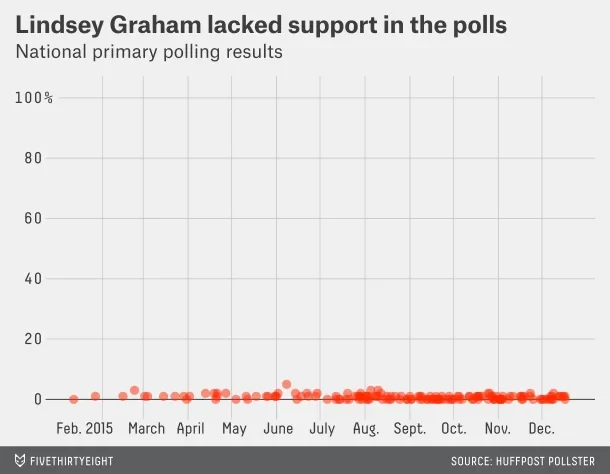
More consequentially, his withdrawal opens up 2008 nominee Sen. John McCain to make an endorsement (McCain had pledged to support Graham, his good friend, as long as Graham was running). This could provide someone a boost in New Hampshire, allegedly.
Republicans debate immigration
An event more likely to have had immediate impact was the final G.O.P. debate of the year, which took place on December 15th. It was billed as chance to see Trump clash with Cruz, but the more important exchange was over immigration between Rubio and Cruz. Rubio has tried to muddy the waters on Cruz’s position, suggesting it isn’t so different from his own, while Cruz has used the issue to paint Rubio as a “moderate” on immigration and in general.
Cruz seems to have taken the advantage. 29% of Republicans watching said Cruz won the debate, followed by 25% for Trump (25%) and 16% for Rubio a post-debate YouGov poll. Rubio has also come away from past debates with an improved image. This time viewers were divided about him (26% say their view of Rubio improved, while 19% say it worsened).
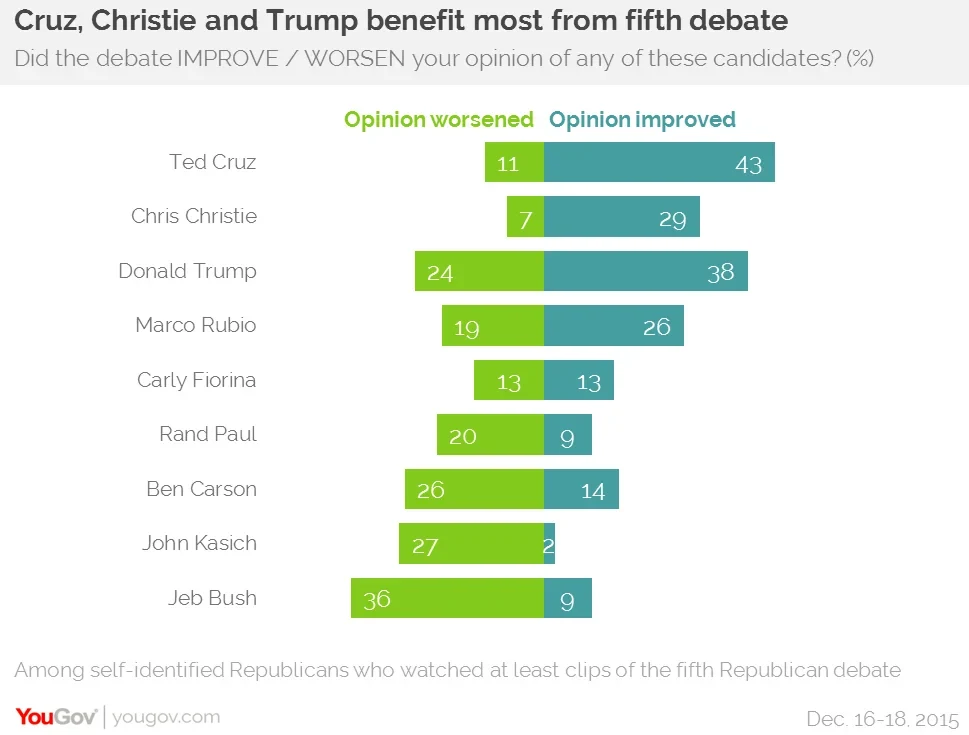
But many Republicans didn’t watch the debate; more important was how the disagreement will play out over the next few weeks.
So far, the advantage goes to Cruz. In the YouGov/Economist poll conducted several days after the debate, Republicans say they are “confident” rather than “uneasy” about how the Texan would handle immigration by a decisive 62-28%, bested only narrowly by Donald Trump (67-29). Republicans are once again divided about Rubio.
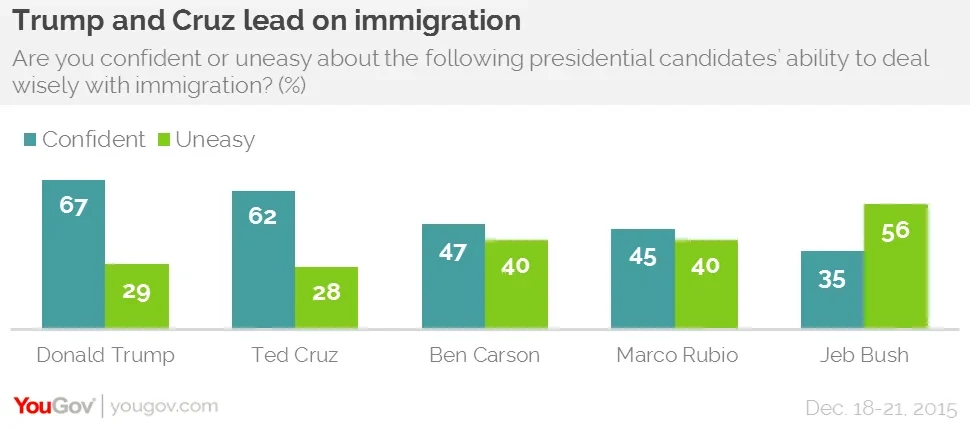
At the moment, Cruz is also surging in the early primary states, especially Iowa. The latest wave of the YouGov/CBS Battleground Tracker, released just over a week ago, showed Cruz nearly doubling his support in Iowa to rise to a 9-point lead over Trump.
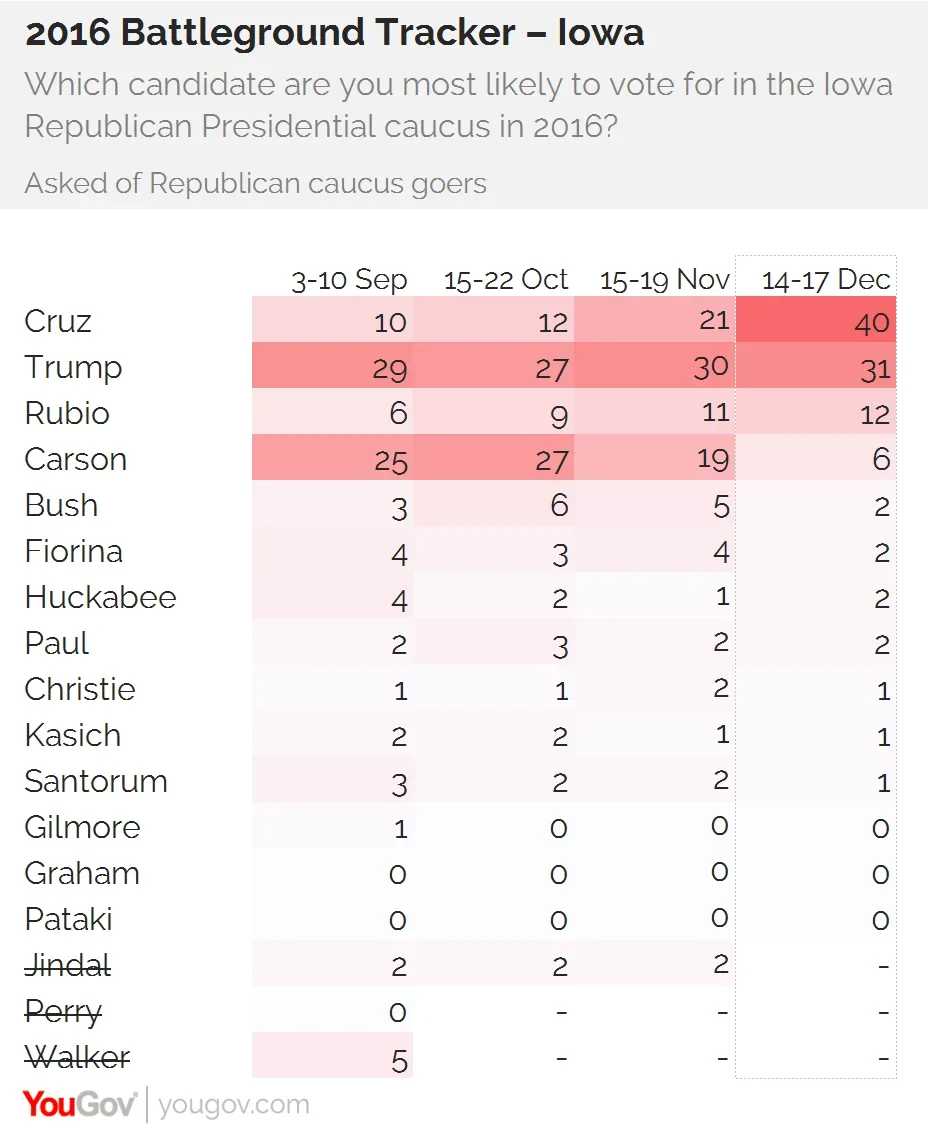
Cruz also improved his standing in South Carolina and New Hampshire.
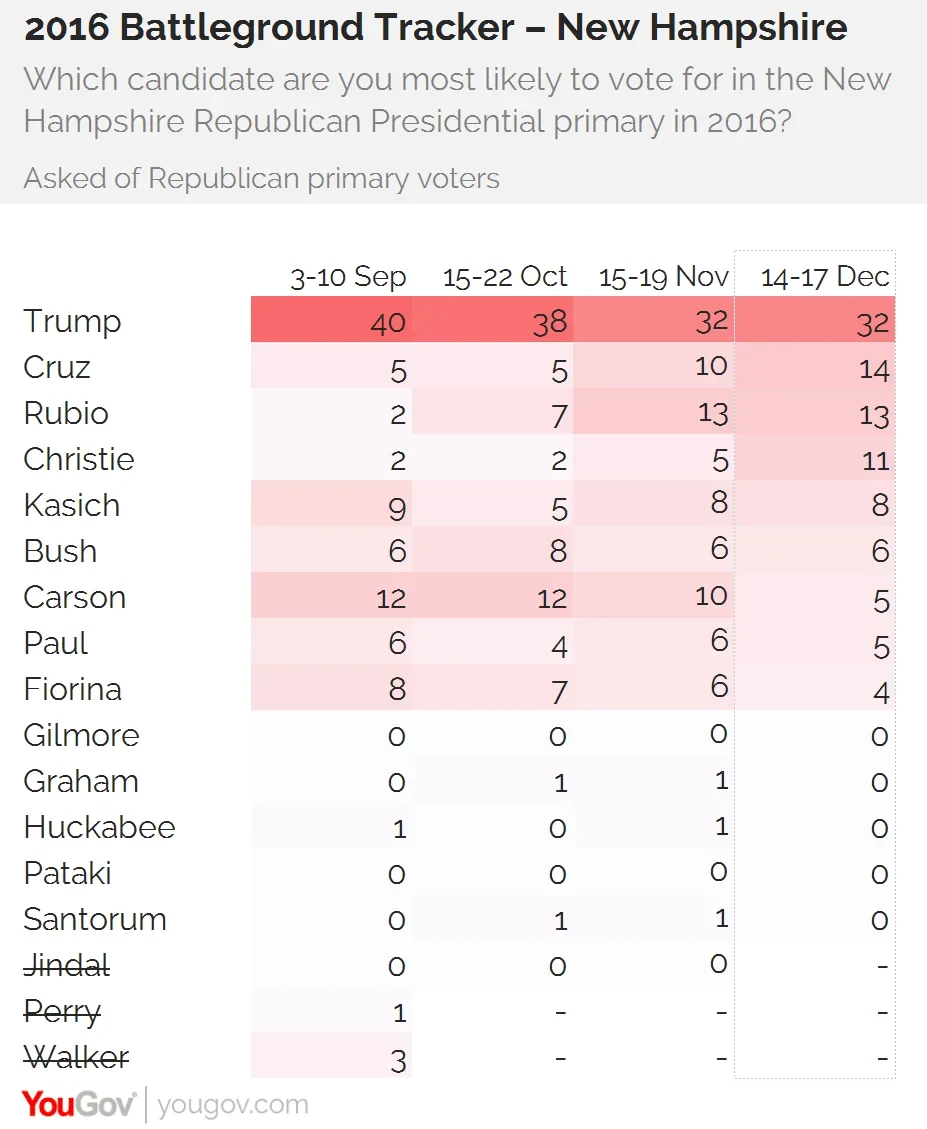
Other poll of the early states have found a closer race in Iowa and Rubio performing better in New Hampshire, but Cruz is clearly having a "moment". National polls also show Cruz rising, and Rubio falling slightly from his recent peak. It's possible Cruz will flame out in January like Carson did in November, but Cruz has more potential for staying power given his fundraising so far and reportedly strong ground operation in the early states.
Note however, the “predictiveness” of primary polls more than a month before the actual election is limited, as explained by Harry Enten in a recent FiveThirtyEight analysis.
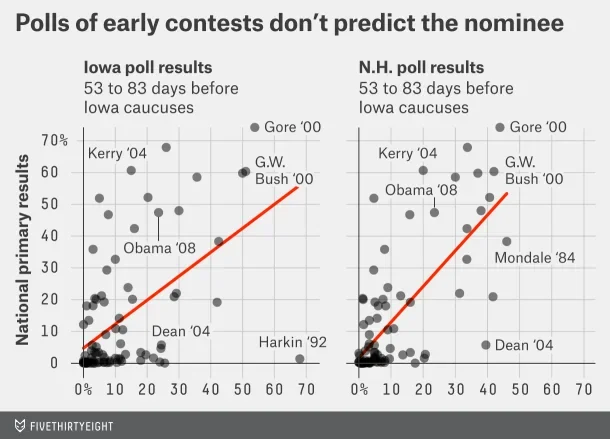
Probably more important is how they shape expectations. Polls like these potentially benefit a late-riser like Christie or Rubio, who might find it easier to beat expectations (and the polls) in New Hampshire than Cruz will find it in Iowa.
The other debate
The Republicans aren’t the only party to have had a debate recently, though the DNC might like it to seem that way. The December 19th Democratic debate (in New Hampshire) was mostly uneventful, even when it came to the party's latest drama: Bernie Sanders’s campaign’s breach of Clinton voter data. Sanders apologized to Clinton and Clinton agreed it was time to “move on”. The Sanders campaign has successfully used the fight with the DNC in its fundraising pitch, but the few national polls taken since the flap show Clinton retaining wide leads.
The YouGov/CBS News polls (conducted before the data breach story blew up) do show Sanders strengthening his position in all of the early states, albeit marginally.
Sanders has a 14-point lead in New Hampshire in the new YouGov/CBS News polls, but other polls have shown a much closer race there.
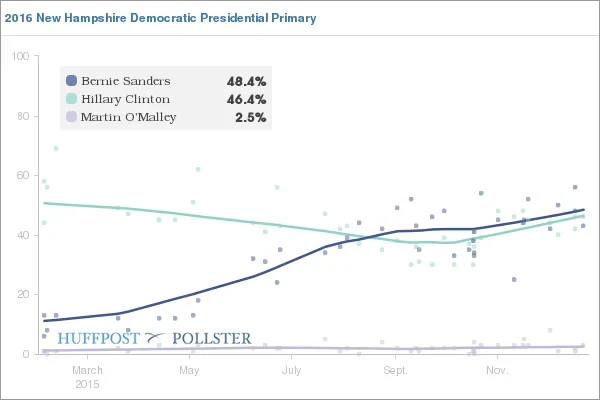
And while Clinton leads in Iowa, the state seems very much up for graps.
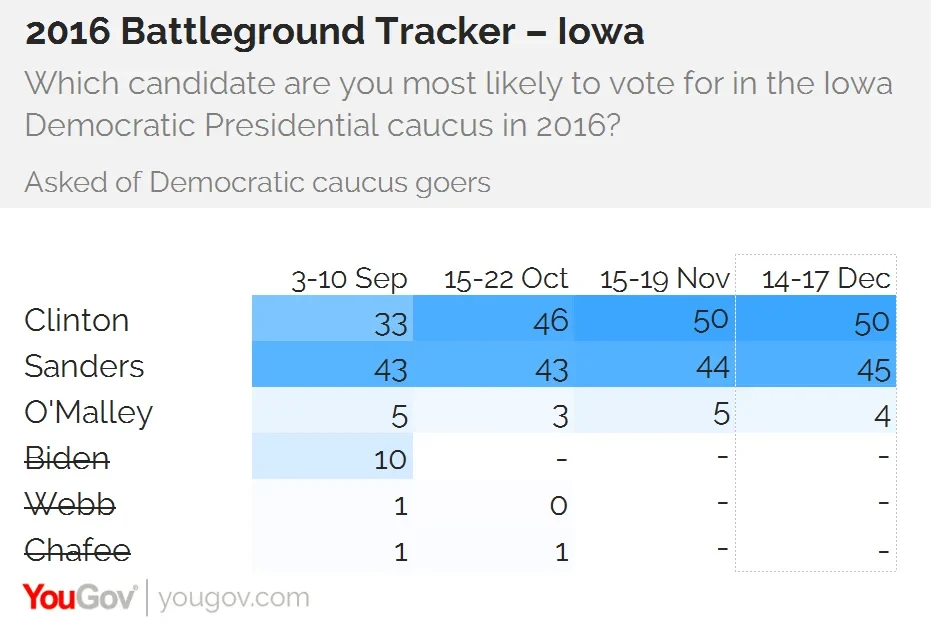
Even so, Clinton remains way ahead in South Carolina, where African Americans make up a majority of the electorate, suggesting Sanders has yet to expand his appeal much beyond the white, liberal base that fuels his strength in Iowa and New Hampshire.
Sanders also continues to trail Clinton hugely on national security issues – even as he leads her on trustworthiness.
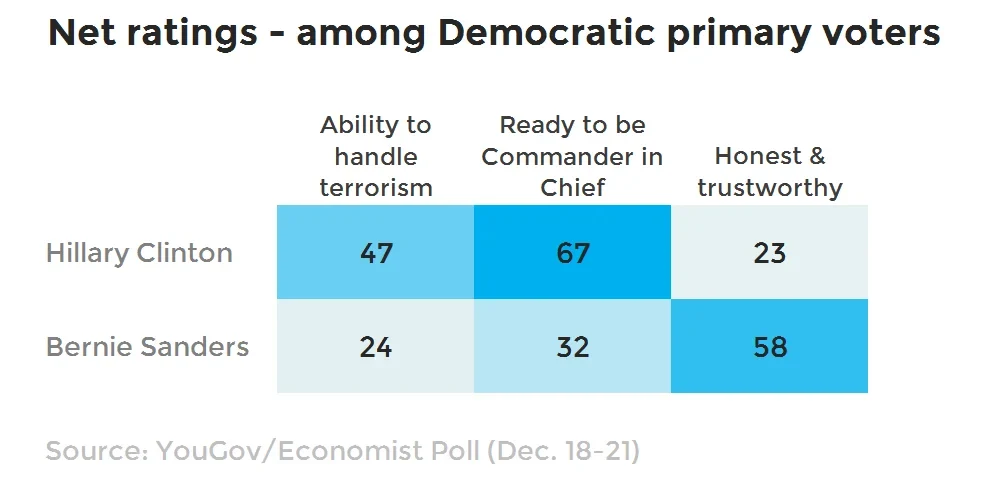
Democrats are far less likely than Republicans to name “terrorism” as their most important issue (11% versus 35%), but roughly two-thirds are nevertheless concerned an imminent terrorist attack is at least somewhat likely.
Which Obama will we get?
The president ended 2015 with his approval numbers dipping somewhat. But on average, 2015 marked an improvement over 2014.
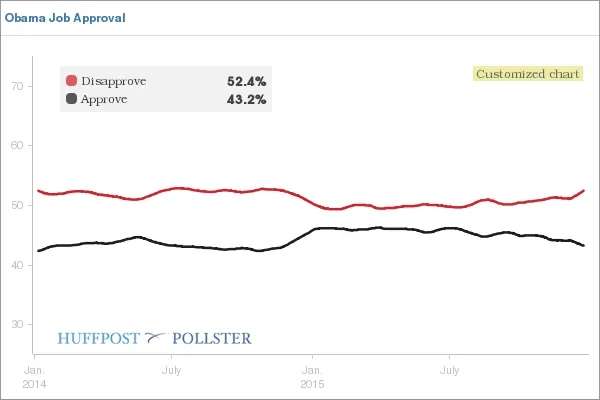
Historically there has been some correlation between a sitting two-term president’s approval ratings and the performance of his party’s next presidential candidate. If Barack Obama’s rating stays in the 44-48% range in 2016 (around the historical average for U.S. presidents), his impact on the race may be a wash. If 2016 Obama is more like 2014 Obama, expect more headlines about what a drag the president is on Democrats – in the presidential race and all the way down the ballot.
2016 arrives
January 1st marks the beginning of a new year – but also one month until the Iowa Caucuses! Lots can change in these final weeks, as many voters begin truly paying attention for the first time. Remember that Rick Santorum never led in a single Iowa poll, but surged at the last minute to narrowly beat Mitt Romney there.
Here is the schedule for the initial voting:
Monday, February 1: Iowa caucuses
Tuesday, February 9: New Hampshire
Saturday, February 20: Nevada caucus (Dem); South Carolina (GOP)
Tuesday, February 23: Nevada caucus (GOP)
Saturday, February 27: South Carolina (Dem)
And on that note, have a Happy New Year.
PA image
